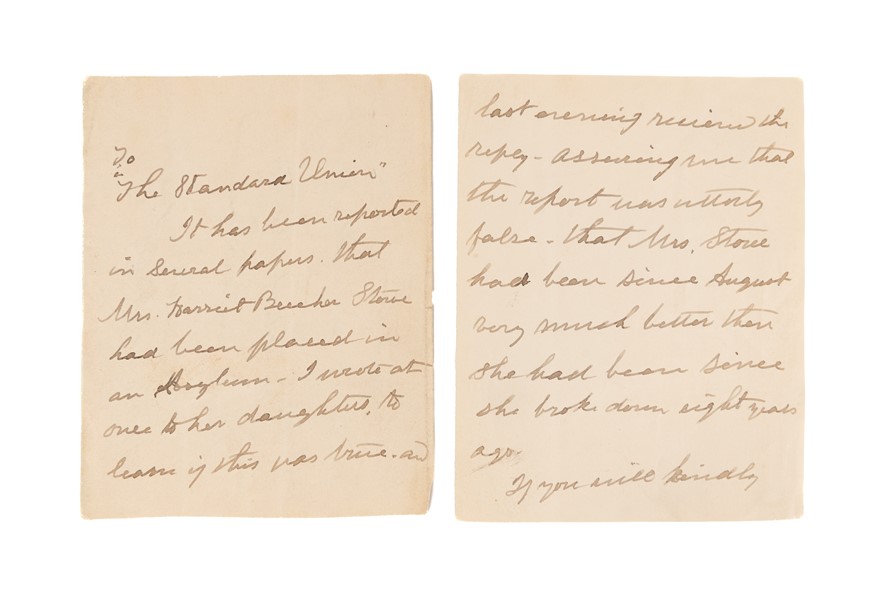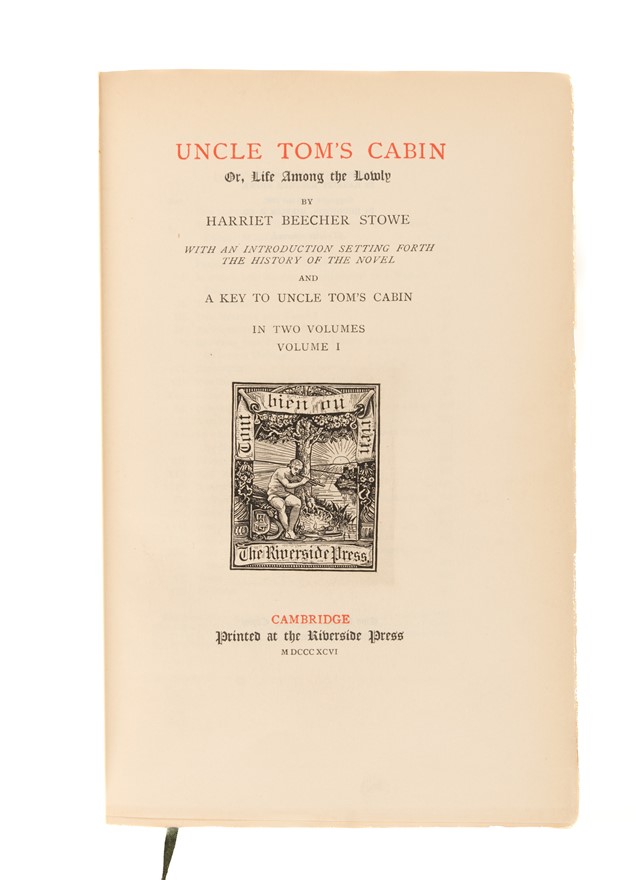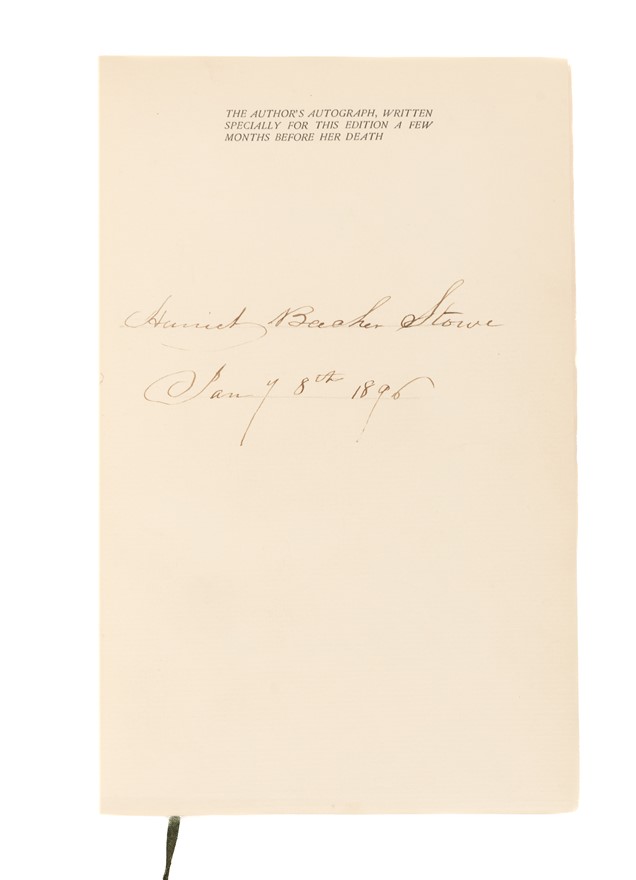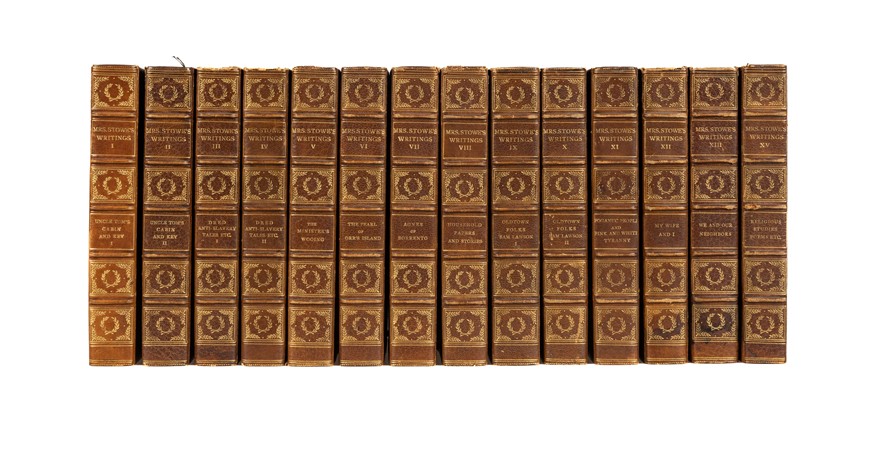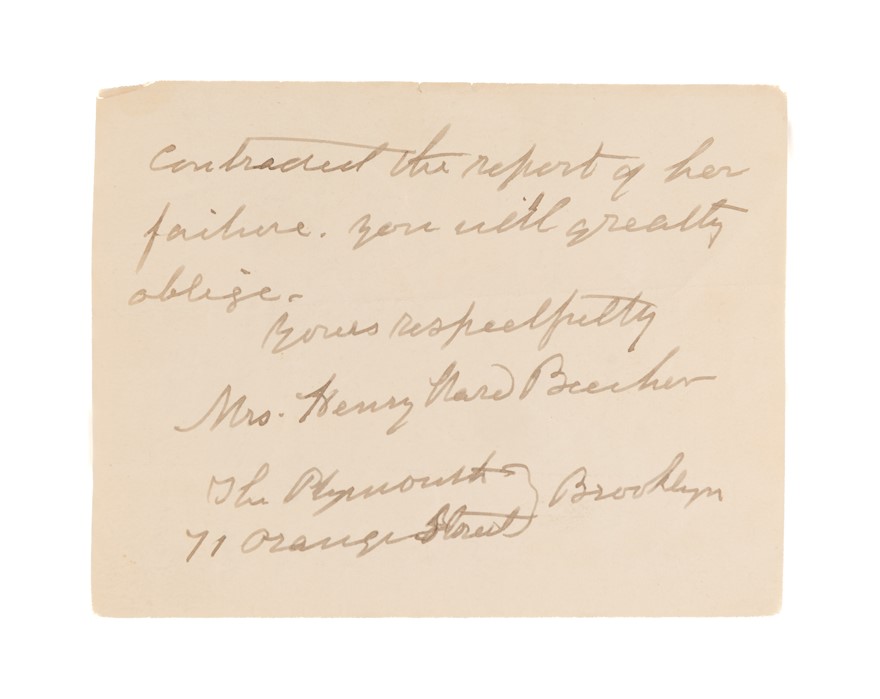The Writings of Harriet Beecher Stowe.
STOWE Harriet Beecher (1896)
£5600.00 [First Edition]
Please contact us in advance if you would like to view this book at our Curzon Street shop.
MRS. HARRIET BEECHER STOWE IS NOT INSANE
First Edition thus. 8vo. 14 [of 16] vols. Some water staining to a few of the volumes and a little browning in places. Contemporary three quarter oliver morocco and marbled boards, spines tooled in gilt, marbled endleaves, top edge gilt (spines evenly faded).
Cambridge [Mass]: at the Riverside Press,
First edition of the Riverside Press Writings of Harriet Beecher Stowe. No. 231 of 250 copies. Vol 1 signed "Harriet Beecher Stowe / Jan ^y^ 8th 1896" on a special leaf "written specially for this edition a few months before her death". Lacking two volumes: (XIV) Stories, Sketches and Studies (XVI) and Stories, Sketches for the Young.
A handsome inscribed set with an interesting note from Stowe's sister-in-law, Eunice White Beecher, to "The Standard Union" newspaper (of Brooklyn) loosely inserted in the first volume refuting the suggestion that Harriet Beecher Stowe had been placed in an asylum.
The note (written on two small slips of paper) reads:
"To / "The Standard Union" / It has been reported in several papers that Mrs Harriet Beecher Stowe had been placed in an Asylum - I wrote at once to her daughters to learn if this was true and last evening received the reply - assuring me that the report was utterly false, that Mrs Stowe had been since August very much better than she had been since she broke down eight years ago. If you will kindly contradict the report of her failure you will greatly oblige. Yours respectfully / Mrs Henry Ward Beecher / The Plymouth / 71 Orange Street / Brooklyn"
The reports of Harriet Beecher Stowe's supposed mental health crisis appeared in various US newspapers in 1895 suggesting that Stowe had been placed in a mental asylum. Stowe famously suffered from poor mental health towards the end of her life, most likely suffering from (what we now know to be) Alzheimer's disease. Stowe famously began to write Uncle Tom's Cabin again, entirely unaware that she had published it forty years before. Mark Twain (a neighbour of Stowe's in Connecticut) recalled this period in his autobiography:
"Her mind had decayed, and she was a pathetic figure. She wandered about all the day long in the care of a muscular Irish woman. Among the colonists of our neighborhood the doors always stood open in pleasant weather. Mrs. Stowe entered them at her own free will, and as she was always softly slippered and generally full of animal spirits, she was able to deal in surprises, and she liked to do it. She would slip up behind a person who was deep in dreams and musings and fetch a war whoop that would jump that person out of his clothes. And she had other moods. Sometimes we would hear gentle music in the drawing-room and would find her there at the piano singing ancient and melancholy songs with infinitely touching effect".
A notice appeared in the newspapers in March 1895 noting, "numerous inquiries as to her condition [Stowe's], owing to the publication in New-York of a sensational story that she had become violently insane". The notice in the paper includes a statement from her doctor (and brother), Edward Beecher Hooker, in which he writes:
"In accordance with the wishes of the family of Harriet Beecher Stowe, I desire to state, as her physician, that there is no change in her condition except that she is in better health than usual. She spends much of her time outdoors, visiting freely her friends and neighbours".
The author of the letter, Eunice White Beecher (1812-1897, nee Bullard) was married to Stowe's brother, Henry Ward Beecher (1813-1887) a clergyman, reformer and supporter of the abolition of the slave trade. The pair married in 1837 but it was not a happy relationship, partly due to Beecher's absence from home for long periods and also due to the repeated accusations of adultery made against him. These claims came to a dramatic conclusion when Beecher was accused of adultery with Eunice White Beecher's friend Elizabeth Tilton in 1870 in what would become known as "The Beecher-Tilton Scandal Case".
Eunice Beecher wrote a memoir of her early married life under the pen name "A Minister's Wife" which was published as From Dawn to Daylight: A Simple Story of a Western Home (1859).
Stock Code: 245256
